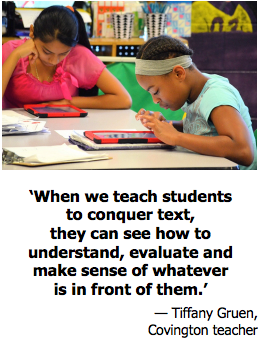
Special to NKyTribune
Kentucky’s new English, math and science standards support each other by connecting knowledge and skills across subjects; providing a deeper and more connected learning experience. As a result, students are more engaged and teachers develop ownership of the curriculum.
“Expanding Literacy: Reading, Writing Emphasized Beyond English Class” provides a snap shot into Kentucky’s social studies and science classrooms. Teachers are using historical texts, literature and journal articles to engage students in history and science while also strengthening their reading and comprehension skills.
Fifth grade teacher, Tiffany Gruen, at John G. Carlisle Elementary School in Covington, KY has her students read the full text of the Declaration of Independence and the Constitution. “That’s meaty text for fifth graders, but they are so interested,” Gruen commented. “With my support, they can make sense of what was happening so long ago, understand the issues, and connect them to life today.”
“Students today are spending more time analyzing information, formulating ideas, and discussing issues and opinions,” said Justin Bailey, a Magoffin County High School social studies teacher. Bailey uses literature like Uncle Tom’s Cabin (1852) and The Grapes of Wrath (1939) to deepen his students’ understanding of history and exposure to classic novels.
Kentucky’s new Academic Standards in English Language Arts state the importance of reading, writing, listening and speaking across different disciplines. The standards state specifically that providing professional texts, historical documents, and classic literature “build a foundation of knowledge in these fields that will also give [students] the background to be better readers in all content areas.”
“One of the hallmarks of the new standards is this idea of cross-content teaching and learning — where students benefit from English, math, science, social studies and the arts being taught interchangeably across their classes. This requires teachers to think differently about their lesson plans and requires a higher degree of sharing and collaboration between different content teachers in their own schools and same content teachers across Kentucky. The more our teachers have the opportunity to collaborate and strengthen their skills, the better prepared our students will be for a rich and engaging future,” said Brigitte Blom Ramsey, executive director of the Prichard Committee.
Pennye Rogers, a 27-year veteran science teacher at Todd County Central High School commented that teachers and students were used to classroom lessons that didn’t ask or deliver much. The new standards have caused teachers to adjust to new ways of teaching and have altered student’s expectations of school. “Once we can accomplish this shift in learning, which may take a few years, we’ll be able to build a real culture of inquiry where students will be able to think without expecting the teacher is going to give them all of the answers,” said Rogers.
This report is the second in a series of three reports illustrating the shifts in teaching and learning happening in Kentucky’s schools as a result of the adoption and implementation of Kentucky’s new Academic Standards and the Professional Growth and Effectiveness System for teachers. The previous report “Finding Solutions: Standards Push Students Toward Real Life Problems” can be found at www.prichardcommittee.org.
The Prichard Committee for Academic Excellence is an independent statewide advocacy organization dedicated to the improvement of education for all Kentuckians.
Northern Kentuckians Helen Carroll and Jim Votruba serve on the Prichard Committee board.























